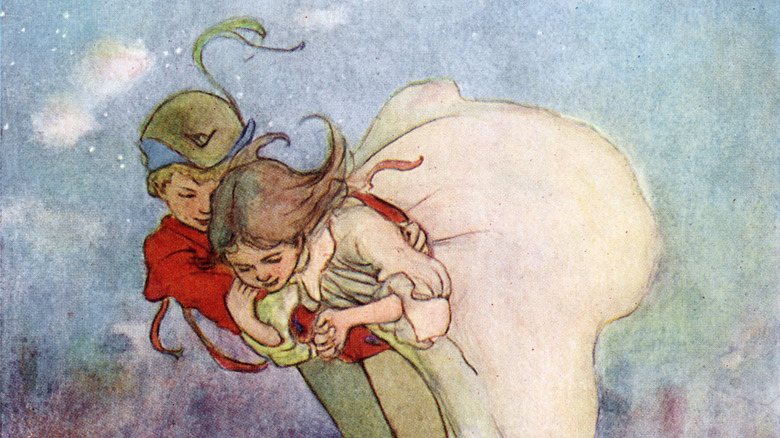What Is A 'Peter Pan And Wendy' Relationship Dynamic And How Do You Spot The Signs?
We may receive a commission on purchases made from links.
Some would argue that there is no such thing as a perfectly equal 50-50% in a relationship, not all the time anyway. Sometimes you're the one putting in more effort, and at other times, it's your significant other who's doing the heavy lifting.
No matter what you believe about the 50-50% principle, you would probably agree that maturity, communication skills, and taking responsibility are some important elements in relationship satisfaction. Which is why you might notice something amiss if your romantic relationship resembles that of a parent and child. Is your partner unable to hold down a job or take up financial responsibility? Do they move from one relationship to another without properly committing to anything? Do you find the need to pick up after them, take care of them, and parent them from time to time? These are all classic signs of what psychologist and author Dr. Dan Kiley termed the Peter Pan syndrome in his 1983 book, "The Peter Pan Syndrome: Men Who Have Never Grown Up." And guess what? You've unwittingly become the Wendy in the equation. Peter Pan and Wendy may have warmed children's hearts in books and movies, but in real life, nothing can feel more frustrating.
Even though Kiley's research findings were presented through an outdated lens of gender and sexuality (via Medical News Today), a Peter Pan and Wendy dynamic can be one of the biggest deal-breakers in relationships even today. Wondering if you're stuck with a Peter Pan? Let's find out.
How to spot the signs of a Peter Pan and Wendy relationship
California-based clinical psychologist Carla Marie Manly told NBC News, "Peter Pans have a playfulness that can be wonderful — yet works against involvement in life's duties; a boyish charm that is both captivating and irritating (due to the avoidance of adult reality)." While in theory, meeting a person with childish awe can feel refreshing, things can start to quickly feel burdensome and exhausting when you find that the partner you're trying to adult with is either ill-equipped or refusing to grow up.
Slipping into the role of Wendy is often something that happens without you even noticing it, which is why it's important to look for signs. Do you find yourself making all the major decisions in your relationship dynamic? What about responsibilities? Are you the one handling the finances, future plans, and day-to-day tasks? Is your partner unable to express his emotions properly? Do they procrastinate a lot? Do they blame others for their problems? Do you often catch yourself thinking in your head that you feel more like your partner's parent than their equal? Spotting the clues can be a critical first step.
As psychologist Nathan Brandon shared with NBC News, the problem lies in maturity, more specifically, a lack of it. " ... those who exhibit these behaviors are typically behaving in ways that we might consider someone who is an adolescent to behave," he explained. Contrary to what you might think, however, there's hope.
What could have caused the dynamic?
While there has not been a lot of published research into the exact causes of how an individual could become a Peter Pan or Wendy, Medical News Today reported that one possible source could be if an individual had overprotective guardians, which is just one of the many ways parents can affect a relationship. The outlet extrapolated by saying that if an individual had overprotective parents, they may have shielded their children from difficulties or challenges that, if experienced on their own, could have helped them develop necessary life skills. As for Wendy's, it could be the opposite. Your Tango cited being "unprotected as a child" as a cause for developing into a Wendy dynamic, resulting in someone wanting to shower their partner in the affection that they did not receive, even if the Peter Pan in their life might not be pulling their own weight.
Kristin Rivera, a licensed clinical social worker, wrote for Arbor Wellness that there may also be certain cultural influences that could cause Peter Pan syndrome. She shared, "Societal pressures or cultural norms that discourage growing up, such as the glamorization of youth, can contribute to the development of Peter Pan Syndrome." She also mentioned that if someone has "trauma or emotional distress," they could, "retreat into a childlike state as a coping mechanism" that could be characterized as the syndrome.
How to change the dynamic
If you think your partner might be open to respectful, open, and honest conversations about the situation, you have a very good chance of altering things so the relationship moves toward something more balanced. If they're willing to listen and change, then that's great. If they're not, you might need to turn to counseling. If that is also out of the question, you're faced with the uncomfortable truth that your relationship might be in trouble. Perhaps it's time to take a step back and reevaluate things.
Spotting the times when your involuntary Wendy impulses crop up is important too. For example, if your spouse has left their dishes in front of the TV for the third time that week, avoid the urge to clean up after them. Psychologist Mark Travers terms these "enabling behaviors" in Psychology Today. When it comes to developing maturity, experience is often the biggest driver. Hand over some household and financial responsibilities to them. Give them room to grow up and make sure you celebrate small successes.
It's important to understand why your partner might be behaving like Peter Pan. Their parents could've been overprotective and therefore stunted their growth in some way. As Travers puts it, "No change can happen overnight. You will have to be patient while you wait to see changes in your partner's behaviors" and also your own.
Possible treatment for a Peter Pan and Wendy dynamic
Kristin Rivera believes that cognitive-behavior therapy (CBT) is often a good place to start in terms of getting treatment for Peter Pan syndrome, writing for Arbor Wellness that it can be "effective in helping individuals recognize and challenge the irrational beliefs that contribute to their reluctance to embrace adult responsibilities." She added that "CBT focuses on developing emotional regulation, increasing self-awareness, and fostering more mature and responsible behaviors." For the Cleveland Clinic, registered psychotherapist Natacha Duke wrote that oftentimes the core of therapy revolves around increasing an individual's distress tolerance. "What often happens with people who have a low distress tolerance is that the minute something uncomfortable bubbles up, they push it away," she shared. "They're not even really knowing what they're feeling and there's not that connection." To help build a tolerance to stress, Duke says that individuals can first learn to make space for their feelings, which can eventually help them to rely less on unhealthy coping mechanisms.
But as implied by the name, there is oftentimes both a Peter Pan and a Wendy, and in order to seek treatment for both parties, the Cleveland Clinic suggested individual, couples, or family therapy to help all parties involved understand how life events have resulted in the behaviors that they are displaying. However, it's always important to know how someone could benefit from a therapist, with Duke pointing out that, "For therapy to work, they need to be willing to recognize and discuss what changes they want for their life and the cost of continuing if they do not make these changes."



